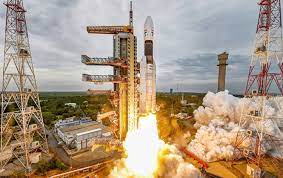Ahmedabad
(Head Office)Address : 506, 3rd EYE THREE (III), Opp. Induben Khakhrawala, Girish Cold Drink Cross Road, CG Road, Navrangpura, Ahmedabad, 380009.
Mobile : 8469231587 / 9586028957
Telephone : 079-40098991
E-mail: dics.upsc@gmail.com

FDI in Space Sector of India
News: Recently, the Union Government approved 100% FDI in the Space sector.
India and Space Sector
• The Indian Space Economy is estimated at around $8.4 billion (around 2-3% of global space economy).
• India has privatised space launches and is targeting a five-fold increase in its share of the global launch market.
• Budgetary Allocation: The Department of Space has received a nominal hike of 4% in its allocation in the Interim Union Budget for 2024-25, from ₹12,545 crore to ₹13,043 crore.
• It is expected that with the implementation of the Indian Space Policy 2023, $44 billion Indian space economy can be achieved by the year 2033.
• The number of Space Start-Ups have gone up, from just 1 in 2014 to 189 in 2023 as per DPIIT Start-Up India Portal. The investment in Indian Space Start-Ups has increased to $ 124.7 Million in 2023.
Policy Changes and FDI in Space Sector
• The proposed reforms seek to liberalise the FDI policy provisions in the space sector by providing FDI in Satellites, Launch Vehicles and associated systems or subsystems, Creation of Spaceports for launching and receiving Spacecraft and manufacturing of space related components and systems.
• The liberalised entry routes under the amended policy are aimed to attract potential investors to invest in Indian companies in space.
The Entry Routes:
• Up to 74% under Automatic route: Satellites-Manufacturing & Operation, Satellite Data Products and Ground Segment & User Segment.
• Beyond 74% these activities are under government route.
• Up to 49% under Automatic route: Launch Vehicles and associated systems or subsystems, Creation of Spaceports for launching and receiving Spacecraft.
• Beyond 49% these activities are under government route.
• Up to 100% under Automatic route: Manufacturing of components and systems/ sub-systems for satellites, ground segment and user segment.
Significances of FDI in Space Sectors
• Private Sector Participation: The Indian space structure is moving from building India’s capabilities under ISRO to further capitalization of space-based technology for commercial applications as well as industry involvement in the sector.
• It is expected to integrate Indian companies into global value chains.
• Space Missions: India has achieved many considerable feats in space missions and has established its name in the global picture as a provider of reliable and cost-effective space solutions.
• Technology Absorption and Global Integration: It will enable modern technology absorption.
• With increased investment, companies could achieve sophistication of products, global scale of operations, and enhanced share of the global space economy.
• It is expected to integrate Indian companies into global value chains.
• Boost Manufacturing: Companies will be able to set up their manufacturing facilities within the country, encouraging the Government’s ‘Make In India’ initiative.
• Ease of Doing Business: The FDI policy reform will enhance Ease of Doing Business in the country, leading to greater FDI inflows and thereby contributing to the growth of investment, income, and employment.
• Promote Research and Innovations: FDI in space will promote technology transfer and research innovations.
Concerns and Challenges
• Limited Investor Interest: There is limited investor interest at later stages of development.
• This could be due to the high-risk nature of space investments and the long-term return on investment.
• Talent Pool: The talent pool for space tech startups needs to grow.
• There is a need for more skilled professionals in the field of space technology.
• Policy Clarity: There is a need for more policy clarity.
• Clear and consistent policies can help attract more foreign investors.
• Simplifying the FDI Process: The process for foreign direct investment needs to be simplified.
• A complex process can deter potential investors.
• Capital-Intensive Requirements: Space technology is capital-intensive.
• This means that it requires a significant amount of capital investment, which can be a challenge for startups and smaller companies.
• Conflict of Interest with ISRO: Foreign investors have been on the fence about investing in the Government monopolised Indian space sector.
• The conflict of interest with ISRO as a competitor had perpetuated apprehension in the minds of foreign investors.
Conclusion
• India’s space sector is poised for a bright future, with significant policy changes, increased FDI, and a focus on private sector participation.
• The sector is set to make a lasting impact on space exploration and technology, fostering significant growth and paving the way for a new era of space exploration.

Address : 506, 3rd EYE THREE (III), Opp. Induben Khakhrawala, Girish Cold Drink Cross Road, CG Road, Navrangpura, Ahmedabad, 380009.
Mobile : 8469231587 / 9586028957
Telephone : 079-40098991
E-mail: dics.upsc@gmail.com
Address: A-306, The Landmark, Urjanagar-1, Opp. Spicy Street, Kudasan – Por Road, Kudasan, Gandhinagar – 382421
Mobile : 9723832444 / 9723932444
E-mail: dics.gnagar@gmail.com
Address: 2nd Floor, 9 Shivali Society, L&T Circle, opp. Ratri Bazar, Karelibaugh, Vadodara, 390018
Mobile : 9725692037 / 9725692054
E-mail: dics.vadodara@gmail.com
Address: 403, Raj Victoria, Opp. Pal Walkway, Near Galaxy Circle, Pal, Surat-394510
Mobile : 8401031583 / 8401031587
E-mail: dics.surat@gmail.com
Address: 303,305 K 158 Complex Above Magson, Sindhubhavan Road Ahmedabad-380059
Mobile : 9974751177 / 8469231587
E-mail: dicssbr@gmail.com
Address: 57/17, 2nd Floor, Old Rajinder Nagar Market, Bada Bazaar Marg, Delhi-60
Mobile : 9104830862 / 9104830865
E-mail: dics.newdelhi@gmail.com